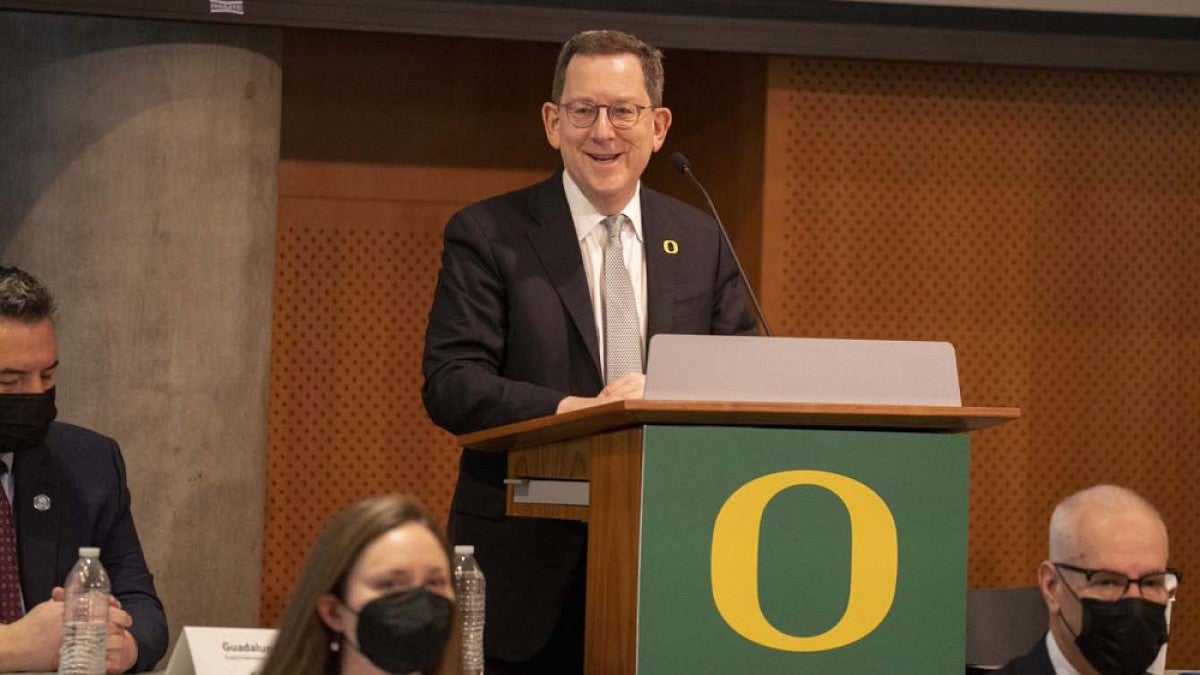Leaders of the University of Oregon, the UO’s College of Education and Portland Public Schools gathered on March 1 to discuss the critical need behind the creation of The Ballmer Institute for Children’s Behavioral Health.
The Portland-based institute, made possible by a lead gift of more than $425 million from Connie and Steve Ballmer, will establish a new national model for providing behavioral and mental health care to school children, through a partnership that brings together the UO’s top-ranked research programs, Oregon K-12 public schools, and community support groups.
“Today is a great day for the University of Oregon, but more importantly, a great day for the people of Oregon,” said UO President Michael H. Schill. “Kids are suffering, our state needs help, and the University of Oregon is uniquely capable of providing that help. We have top-flight research and teaching programs in education and psychology, full of people who care and are experts in these fields.”
The COVID-19 pandemic has exacerbated existing gaps and inequities in behavioral and mental health care for children, Provost Patrick Phillips noted, with the U.S. Surgeon General declaring the problem a national crisis late last year.
The UO plans to launch a new undergraduate degree program, as well as a certificate program, to empower a new diverse workforcer to meet children’s behavioral and mental health care needs within K-12 public schools and other service-oriented organizations.
“The students of the University of Oregon come to us asking how can they make a difference, how can they help the world. And this is an opportunity to do that,” Phillips said.
The institute will partner with K-12 schools statewide, beginning with Portland Public Schools, the largest school district in the state.
“Portland Public Schools is incredibly proud and excited about this partnership with the UO,” district Superintendent Guadalupe Guerrero said. “It’s so critical to address both the observable and growing needs for behavioral and mental wellness among our student population.”
Goals for the institute include graduating at least 200 behavioral health practitioners annually from the proposed bachelor degree program, as well as offering a certificate program to current K-12 educators and other mid-career students.
Randy Kamphaus, the acting executive director for the Ballmer Institute, said he feels the urgency to launch the institute’s work quickly. Plans are being made to start instructional workshops in Portland schools in the summer, to launch the certificate program in the fall, and to welcome the institute’s first class of undergraduate students in fall 2023, he said.
The institute plans to hire more than 20 new faculty members to expand the body of research and develop new innovative programs to help children at various intervention stages, including in early childhood and during adolescence.
“The field of prevention science really focuses on preventing behavioral health and other problems in the community by looking at ways to detect things early, to develop interventions that can support optimal development and growth, and (deliver) healthy outcomes,” said Laura Lee McIntyre, Castle-McIntosh-Knight professor in the Department of Special Education and Clinical Sciences.
“We know that adolescence is the period where you see the greatest risk for the onset of mental and behavioral health disorders,” added Jennifer Pfeifer, a professor of developmental science in the UO Department of Psychology. “In the state of Oregon, in the last year alone, 1 in 5 youth ages 12 to 17 experienced a major depressive episode…. While prevention is essential, late childhood and adolescence is also not too late to intervene.”
The gift from Connie and Steve Ballmer will support the institute and will be used to establish a $100 million endowment fund to provide scholarships to Oregon students, with the goal of building a diverse and culturally rich workforce prepared to work directly with those in need throughout the state.
“I’m increasingly convinced that donors, like the Ballmers, are asking of us to leverage our core mission of teaching and research into more immediate and direct impacts on society,” UO Vice President for University Advancement Michael Andreasen said. “They’re asking us to tackle the grand challenges, and the Ballmer Institute for Children’s Behavioral Health does just that.”
The institute will be located at the former Concordia University campus in northeast Portland, with the University of Oregon Board of Trustees expected to review a purchase agreement at its March meeting.
—By Saul Hubbard, University Communications


